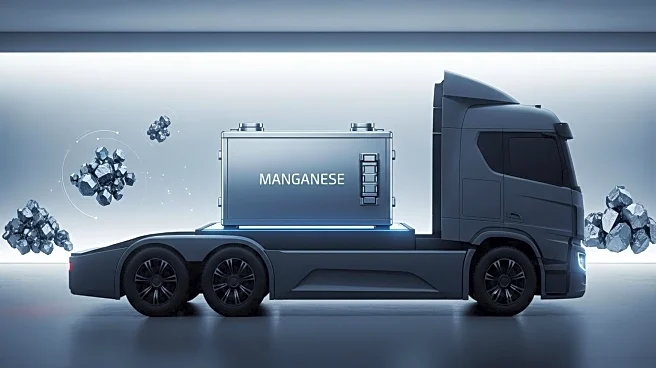What's Happening?
General Motors (GM) is advancing its electric vehicle strategy by developing a manganese-rich battery in collaboration with LG, set for mass production in 2027. This battery technology, known as LMR, has won the 'Battery Innovation of the Year' award at Detroit's annual battery expo due to its high energy density and cost-effectiveness. GM plans to release more affordable electric trucks with a 400-mile range by 2028. The LMR battery offers a third higher energy density compared to lithium ferrophosphate (LFP) batteries, making it a competitive alternative to nickel-based batteries, which are more expensive and volatile. GM's strategy also includes establishing a rare-earth magnet supply chain in the U.S., a move vindicated by China's recent export restrictions on these materials.
Why It's Important?
GM's development of the LMR battery and its efforts to localize the rare-earth magnet supply chain are significant for the U.S. electric vehicle industry. By reducing dependency on Chinese imports, GM is positioning itself as a leader in sustainable and cost-effective EV production. This strategy not only enhances GM's competitiveness in North America but also aligns with broader national interests in securing critical materials for technology and defense. The shift could lead to increased domestic manufacturing jobs and bolster the U.S. economy by reducing reliance on foreign supply chains.
What's Next?
GM is expected to continue expanding its electric vehicle lineup, leveraging the LMR battery technology for a balance of performance and price. The company is also set to bring two rare-earth magnet manufacturing facilities online by the end of the year, primarily serving GM and the Pentagon. This development may prompt other automakers to explore similar strategies to mitigate risks associated with global supply chain dependencies. The success of GM's localized production could influence policy decisions and encourage further investment in domestic manufacturing capabilities.
Beyond the Headlines
The localization of rare-earth magnet production and the development of the LMR battery could have long-term implications for the U.S. EV industry. It may lead to a shift in global supply chain dynamics, with more companies seeking to reduce reliance on foreign materials. Additionally, GM's strategy could spark innovation in battery technology, driving advancements in energy density and cost reduction. This could ultimately accelerate the transition to electric vehicles, contributing to environmental sustainability and energy independence.









